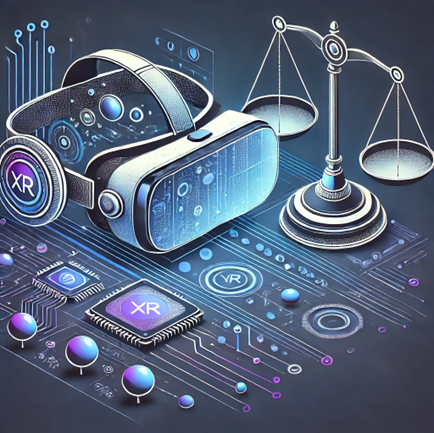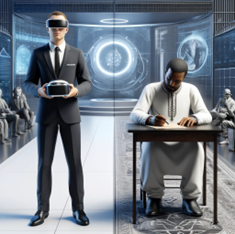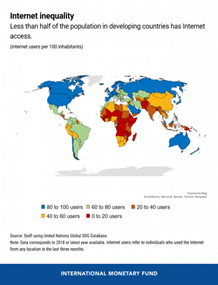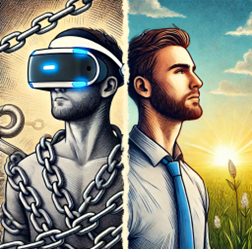
For most people, Extended Reality technology, also known as XR, is hailed as the next technological wave following the internet revolution in the late 20th century. Giants in the tech industry all over the world, like Meta and Apple are embracing this development, all hoping to lead humanity into a new era unlike any before. Public also has tremendous expectations on XR technology, hoping it brings more equity and happiness to the world. While technological advancement undoubtedly brings convenience to our lives, I think it is crucial to approach its impact critically. I believe that even in the future when we enter a new virtual world, the core dynamics of human behavior and societal structures will not change. XR will not lead humans to a wonderland but rather replicate our existing world onto a new platform made of data and code. The challenges and constraints we face at present will remain unchanged —— The virtual world will not provide better equity from the perspectives of access, impunity, and class gap.

XR proliferation has not been fully realized now, and we don’t have much existing evidence to prove that proliferation of XR will have a negative impact on equity. However, we can get some insights from the historical context. I think the development of the internet is a perfect example since the internet, as mentioned in the introduction, is the former technological revolution we’ve just been through. The Internet was once touted as a great equalizer, but I think it has perpetuated and even exacerbated inequalities. Some argue that people with disabilities, who could not go to schools or workplaces, now have access to educational resources by looking up on the Internet and to jobs through remote working. But the premise is that these people have access to the Internet. The harsh reality is that the Internet didn’t provide each individual with the same accessibility, and so XR will follow the Internet's footsteps of providing unequal access. As the IMF map shows, the gap between those who have Internet access and those who don’t is like a chasm: Only about 20% of the population have access to the Internet in some African and West Asian countries while North America has 80% of its population connecting to the Internet. Keep in mind that this is happening at a time when tech companies in the US have already realized XR technology and introduced mass-produced headsets. Moreover, with the development of the economy, this limited access to the Internet will result in worse inequality of job opportunities and income since accessing the Internet greatly increases one’s educational degree and working efficiency. With less people being educated, the economy will be worse, which forms a vicious spiral, exacerbating the inequality. Research also reaches the same idea, indicating that access to the Internet determines a country’s productivity and economy: IMF staff research has found a strong, positive correlation between Internet access and productivity: “a one percentage point increase in the share of Internet users in the population raises per capita growth by 0.1–0.4 percentage points in sub-Saharan Africa”. The digital divide in internet access has exacerbated global inequalities, and the adoption of XR technology is likely to do the same.

Not only did Internet development illustrate more severe inequality, but contemporary research based on VR platforms also indicated this same trend. Some people suggested that with this immersive technology being implemented, the society will be more inclusive, and people with different cultures will empathize more since they can experience what others have been through. But the reality is: people are more likely to engage in disrespectful and other inappropriate behaviors in the virtual world. Individuals interact with others through avatars in the virtual world rather than face-to-face talk with their real appearances. This avatar will constantly remind people that they are in a virtual environment rather than reality. So there's often less concern about the consequences of wrongful actions since these actions may not receive the appropriate punishment in a virtual setting. This can lead to a sense of impunity among users, exacerbating the unequal experiences in the virtual world. Posted on Frontier, “Experiential disparities in social VR: uncovering power dynamics and inequality” showed that women and people of color were often the target of inappropriate behavior like sexual harassment and racial discrimination in chatrooms of virtual world. This aligns with my own experience with VR technology, when I was using a VR headset, roaming in a VR chat room.

Not only did I feel how detached the digital world is from reality, but I also saw someone using a Nazi avatar in the chatroom, openly promoting anti-Semitism. The anonymity and perceived lack of consequences in these virtual spaces seemed to encourage this behavior, as offenders continued even when their actions were called out. This detachment provided by VR can lead to harmful interactions, undermining the supposed inclusiveness and empathy-building potential of the technology. So make XR worsen inequality.

It's not just the differing access levels to technology and the sense of impunity that will lead to these inequalities. In my view, even if everyone had equal access to the XR technology, the world would still maintain its unjust state because technological advancements will not inherently lead to ideological shifts from capitalism to communism: the inequality between elites and civilians will remain. Common people will still be controlled, pressed, and even enslaved by those big capitals and companies like the IOI company in Ready Player One, which hired many people to work for them 24/7, searching for the key and taking control of the whole Oasis world. Wade was lucky that he occasionally found the clue and got the key ahead of the IOI. But what average people did is either work for big companies, or be trampled underfoot by big corporations in the brutal game. This is not just fiction. It mirrors the current social structure and a chilling potential future, where technology merely reinforces our chains and inequalities instead of breaking them.

All the three mentioned inequality are actually due to the problems of the existing societal system instead of technology. In essence, while Extended Reality (XR) technology heralds exciting possibilities, history and current trends suggest it will likely replicate rather than resolve existing societal inequalities. The narrative of technology as a panacea for deep-seated social issues is misleading. Without real, hard-hitting changes to how we handle technology's advancement, we're just setting ourselves up for a future that mirrors today's inequalities. Let's not just strap on our goggles and hope for the best. Instead, we should use these awesome new tools to make a genuine difference, ensuring that XR doesn't just become another playground for the same old power games. Please use tech as a ladder, rather than a bigger stage for the same old problems!
Never tried XR before? Explore your own answer after trying immersive headsets at StudioX!
Image Sources:
Image 2
Images 1,3,4 & 5 are generated by Chat-GPT


